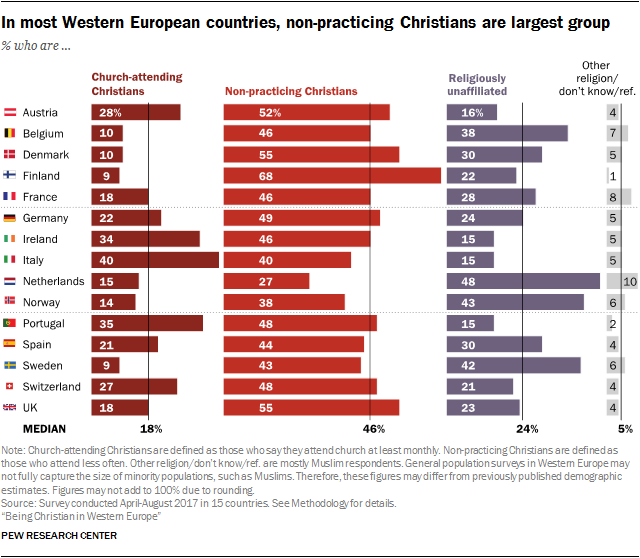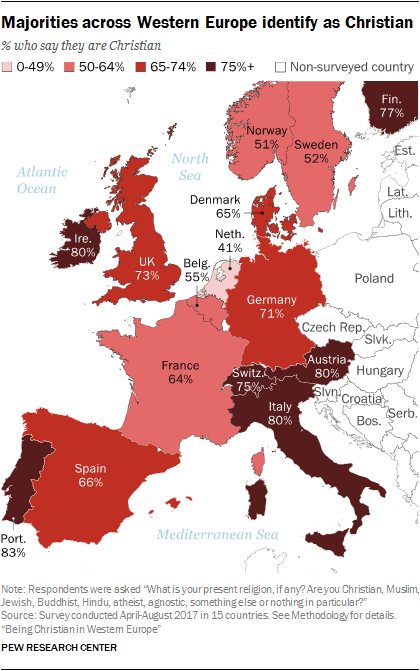England has to come to face what can be seen already in many cities at the continent.
- Statistics from 2011 Census show more Muslim children than Christian growing up in Birmingham
- Of 278,623 youngsters, 97,099 were registered as Muslim compared with 93,828 as Christian
- A similar trend has emerged in the cities of Bradford and Leicester
- Experts said more must be done to ensure that society does not become polarised along religious lines
 |
| English: More crowds on Brick Lane (Photo credit: Wikipedia) |
This frightens many Christians. What I do find strange is that of those scared Christians nobody wonders why so many Caucasians coming form a Catholic or protestant family (Anglican,
Church of England) wanted to convert to a religion which was not for a long time originally present in their surroundings.
In England’s second*
city of Birmingham, of
278,623 youngsters, 97,099 were registered as Muslim compared with
93,828 as Christian. The rest were of other faiths such as Hindu or
Jewish, or none.
A similar trend has emerged in the cities
of Bradford and Leicester, the towns of Luton, in Bedfordshire, and
Slough in Berkshire, as well as the London boroughs Newham, Redbridge
and Tower Hamlets, where nearly two-thirds of children are Islamic.
writes
Paul Alexander in his article Children in many UK Towns and Cities now more likely to be Muslim rather than Christian.
I do agree with Professor Ted Cantle, of the ICoCo Foundation who said:
‘What we are seeing are several trends running together. There is a
long-term decline in support for the established religions, notably
Christianity; continuing immigration from the Asian sub-continent; and
higher fertility among the Muslim population, which has a considerably
lower age profile.
But to me it is not only by deepening segregation exacerbated by the loss of white population from
cities, which the professor and many white people say. It is not only in the cities where we can find more intensive concentration of black and minority ethnic
groups as a result of replacement, that we do find Muslims. In Belgium for example there are a lot of Belgians, with Belgian Caucasian ancestors, who converted to the Islam.
It is far too easy to point the finger to a so called "pace of demographic change" and saying that the Government has no policy to combat segregation
"because it inevitably reduces understanding and tolerance on both sides
of the divide."
We should more come to see that we are going to a secularization because lots of people are not anymore interested in relgion and have no message in the god of others.
Why do not more people come to see that the churches in the West lost their flock? Churches are running, even so much that many churches already became closed and that in many villages there are not any more weekly services. For
Sunday Mass people now have to go a few kilometres out of their doorstep, but this is perhaps demanded too much for them. So where is their connection with their faith and what do they want to do for their faith. The same can be said for their clergymen, are they really going out preaching, proclaiming the Word of God? How many Christians are willing to testify for their faith and do go out preaching the Gospel of the Good News?
Do Christians not have to see in their own bosom, to find that not many Christians really have a true faith?
There is still hope for the
Christian community to have it back growing or not diminishing any more.
The figures show that Christianity is
still the dominant religion in every local authority area in England and
Wales, even in the most culturally diverse towns and cities.
Of the 45.5million participants,
27.9million subscribed to Christianity, compared with 1.8million
Muslims, the second largest grouping.
However, among dependent children –
defined as those aged up to 15, or between 16 and 18 and in education
and still living at home – the gap is narrower.
Of 12.1million youngsters, 6.1million were
Christian and 1million were Muslim. And in some places, the balance has
now tipped towards Islam.
In Bradford, 52,135 children are Muslims
(45 per cent) next to 47,144 Christians; in Leicester the figures are
22,693 and 18,190 respectively.
The widest gap is in Tower Hamlets where 62 per cent of children are Islamic, outnumbering Christians by 34,597 to 8,995.
writes
Paul Alexander.
Sughra Ahmed, president of the Islamic Society of Britain, said:
‘Britain’s
Muslims make up just 5 per cent of the population but have a younger
demographic profile than other faiths, as these figures show. It matters
to us all that this next generation of young British Muslims develops a
clear and confident sense of their British identity alongside their
Muslim faith. It’s important that schools teach all of our children the
values of respect and tolerance.
For every Western country it is important that all children learn to respect all other cultures and religions.
+
Note:
*The Daily Mail, Sept. 15, 2014, denotes Birmingham as England’s
“second city” but some estimates rank Birmingham as the third largest
city by population, below Manchester and London.
+++

